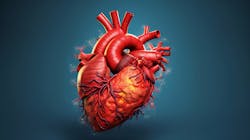New study suggests ECG-AI can detect cardiovascular disease risks sooner
Artificial intelligence (AI) from patient electrocardiograms (ECGs) may be an innovative solution to enhance heart disease risk assessment. Atherosclerotic cardiovascular disease — arteries narrowed or blocked by the accumulation of fatty plaques — is the leading global cause of death and is often driven by coronary artery disease. New study data published in eClinicalMedicine suggest that ECG-AI can flag some risks years sooner than current risk calculator equations by identifying signs of coronary artery disease, such as calcification and blockages, as well as evidence of a prior heart attack.
ECG is a widely available test that measures the heart's electrical activity, and AI can be trained to identify and detect hidden patterns of disease from those electrical signals.
The ECG-AI to predict coronary artery disease was developed at Mayo Clinic and Anumana using the retrospective analysis of electronic health data of over 7 million patients across the U.S. Three separate ECG-AI models were trained, one each to detect coronary artery calcium, coronary artery blockage and segments of the heart's left ventricle not moving well — a sign of a prior heart attack.
"Used together, the three independent ECG-AI models predicted which patients had a high risk of hidden coronary artery disease, and therefore a high risk of having a heart attack. This is important information to guide our conversations with patients at the point of care, especially since the AI was useful in calculating these risks for as short as three years," says Francisco Lopez-Jimenez, M.D., a cardiologist at Mayo Clinic and senior author of the paper. "Used alone, the pooled cohort equation estimates the 10-year risk of developing cardiovascular disease. The addition of ECG-AI to see hidden risks sooner has the potential to save more lives. This model may also help identify people who do not know they have coronary disease who may benefit from lifesaving therapies."

